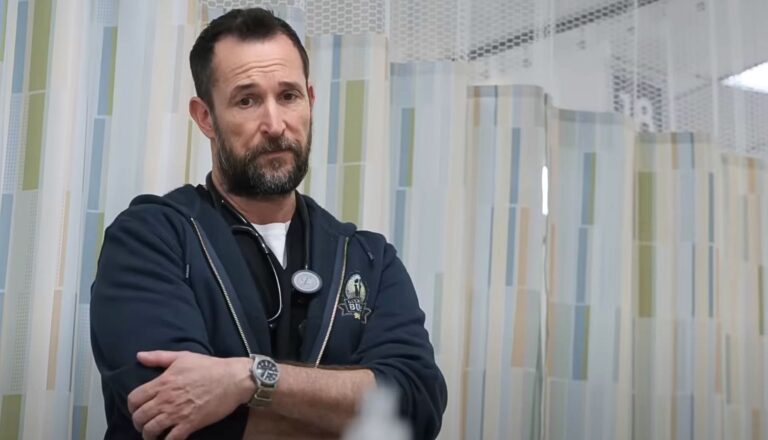
A Knight of the Seven Kingdoms
George R.R. Martin’s ‘A Knight of the Seven Kingdoms’ is more noble than his other works, but it’s quite graphic all the same.

If there’s anything that television’s parade of crime procedurals has taught us, it’s that the United States is a really dangerous place.
There’s really no lack of villains out there, it would seem. Psychopaths. Rapists. Serial killers. They’re all out there, just waiting by our front door, ready to pounce as soon as we’ve finished our morning toast. And they keep replicating: Crime procedural fans might see several new villains every week.
But if American television tells us that things can be dangerous close to home, just wait ’til we see what’s going on abroad.
Criminal Minds: Beyond Borders takes us into the operations of the FBI’s International Response Team—a crack cadre of agents tasked with solving crimes around the world involving Americans, be they victims or perps. As IRT chief Jack Garrett says in the pilot episode, “It’s not their [foreign law enforcement’s] job to worry about missing Americans. It’s ours.”
Garrett is joined in his criminal-busting activities by an assortment of professionals. Clara Seger has rejoined the force after a two-year sabbatical and serves as its supervisory special agent. Matt Simmons brings some detective muscle to the job, while Mae Jarvis offers her medical moxie. And while the rest of the team gallivants around the globe, Russ “Monty” Montgomery tends to stick a little closer to home—typing away on his computers, visiting with involved families and running interference with any Stateside pencil-pushers who might get in the way.
You might be tempted to feel bad for Monty. Garrett and his group fly in their own special jet and visit some of the world’s most exotic locales, while he just stays home and stares at screens in some cubicle (just like a certain television reviewer I could mention). But the IRT’s responsibilities are far from a vacation. At each stop, they must navigate a legion of unfamiliar local customs; coordinate with sometimes resistant local law enforcement; and navigate jungles, deserts and bewildering cityscapes.
All of that while also doing all the standard crime procedural detective work you’ve become accustomed to seeing on TV—easier said than done when the country you’re in is still working on the whole running water thing. The morgues where the autopsies get done certainly tend to be much less snazzy.
And, yes, the team always seems to need a morgue. While the IRT isn’t solely concerned with homicides, a hefty number of cases involve a dead body or two left in a seemingly primeval forest or uncovered at a teeming bazaar. And where there are dead bodies, there’s bound to be blood—seeping out of recent wounds, spattered across walls or leading to a dirty drug den.
Sex crimes are not unheard of, either. In short, Criminal Minds: Beyond Borders has everything—both good and bad—that you’d expect from a CBS crime procedural. It fits the template the network has both honed and amplified for pert near two decades now. Beyond Borders may traipse around the globe looking for all manner of unsavory crimes to solve. But in the end, it looks a whole lot like its TV home.
(Editor’s Note: Plugged In is rarely able to watch every episode of a given series for review. As such, there’s always a chance that you might see a problem that we didn’t. If you notice content that you feel should be included in our review, send us an email at letters@pluggedin.com, or contact us via Facebook or Instagram, and be sure to let us know the episode number, title and season so that we can check it out.)
Two female college students go missing while volunteering at a Thailand farm. It’s first suspected that the girls were lured away in order to be trafficked. “Young, pretty, American—they would’ve gotten top dollar,” Clara speculates. But the kidnapper wants instead to hunt them—releasing them into the jungle so he can track them down and kill them.
This really bad dude has already killed the girls’ male companion (also American), and his body is found bloodied on the ground, a huge wound on the neck (which we see close-up shots of). One girl trips on a booby trap and is speared grotesquely in the leg with a stick. (Her friend pulls the spear out of the bloody wound.) Their pursuer has mutilated himself, sticking what look like massive knitting needles through his cheeks. People are pushed down and held in choke holds. A suicide is shown, with a knife slicing through the person’s neck.
There’s talk of sexism and statutory rape. Also, a peeping Tom. We see a Buddhist statue and Buddhist monks. We hear about a sacrificial rite connected with Mahayana Buddhism. There’s discussion of fate and karma. Characters say “h—,” “d–n” and “a–” (once each). God’s name is misused.

Paul Asay has been part of the Plugged In staff since 2007, watching and reviewing roughly 15 quintillion movies and television shows. He’s written for a number of other publications, too, including Time, The Washington Post and Christianity Today. The author of several books, Paul loves to find spirituality in unexpected places, including popular entertainment, and he loves all things superhero. His vices include James Bond films, Mountain Dew and terrible B-grade movies. He’s married, has two children and a neurotic dog, runs marathons on occasion and hopes to someday own his own tuxedo. Feel free to follow him on Twitter @AsayPaul.

George R.R. Martin’s ‘A Knight of the Seven Kingdoms’ is more noble than his other works, but it’s quite graphic all the same.

Does it take a thief to catch a thief? Does it take lots of bad content to make a good TV show?

The Hunting Party is far from the most gruesome drama on television, but its disturbingly inventive ways of killing may make viewers a bit queasy.

Max’s hospital drama ‘The Pitt’ strives to be medically accurate. While a noble goal, this show comes with a whole lot of content, too.